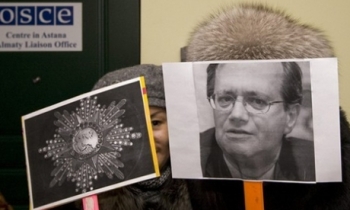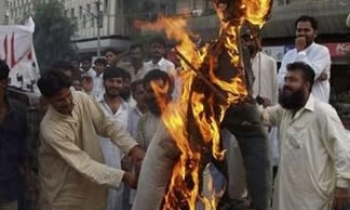The Belarus Information ministry on April 25 requested the Supreme Economic Court to shut down two prominent weekly newspapers, Nasha Niva and Narodnaya Volya, under article 51, subsection 2.2, of the mass media law. This article says that any media organization can be closed after receiving two warnings from the information ministry in a single year.
“The closure of Nasha Niva and Narodnaya Volya would be an extremely grave decision,” Paris-based press freedom group Reporters sans Frontières (RSF) said. “The loss of these two major weeklies, representing nearly half the independent national media circulation, would be a fatal blow to the already extremely limited pluralism of the Belarusian press.” The press freedom organisation has on several occasions condemned this law, which is used as a major weapon for intimidating the independent media.
The warnings issued under the law are for the most part politically motivated and, as the sanction is not automatic, its application is totally arbitrary. The law was already used to force an independent radio station, Avtoradio, to close in January.
This latest request from the information ministry is the logical consequence of the avalanche of warnings that the independent media have received since the Minsk metro bombing on April 11.
Before being reprimanded for a third time in April, both newspapers had already received two warnings in the past year. Nasha Niva was targeted for referring to a highly critical documentary about President Alexander Lukashenko by Russia’s NTV, which was censured in Belarus. Narodnaya Volya was criticised over a story about an opposition campaign for Lukashenko’s resignation and for “discrediting the Red Army” by publishing an account of childhood experiences during World War II.
Both newspapers have been singled out in a wider campaign against all independent media in Belarus. Narodnaya Volya editor Iosif Syaredzich described the warnings as “absurd and far-fetched.” He told RSF: “Our newspaper has never called for violence or for any illegal actions.”
Nasha Niva editor Andrey Skurko said the attacks were proof of “an effort by the authorities to control the flow of information amid growing public concern about social and economic problems.” The authorities “want the official view to hold sway in society,” he added.
“We call on the judges at the Supreme Economic Court to throw out this iniquitous request, which shows the determination of those in power to finish off the few remaining havens of freedom in the country,” RSF said.
However, experts have told the press freedom organisation that the two newspapers have little chance of winning their appeal against the information ministry. The vice-president of the Belarus Association of Journalists (BAJ), lawyer Andrey Bastunets, said that, since 2004, all warnings received by independent media organizations have been upheld on appeal.
The only exception was Avtoradio, which initially won an annulment of the warning only to see it confirmed on a second appeal. Bastunets also pointed out that the verdict would not concern the substance of the issue. “To order the closure of the newspapers, the court simply has to establish that they received at least two warnings in a single year,” he said. “Its decision will therefore be purely technical.”
This threat of closure of these two leading publications is therefore very serious and opens the way for similar proceedings against other media. Narodnaya Volya is the biggest independent newspaper in terms of circulation (50,000 per week). Founded in 1906 and one of the oldest weeklies, Nasha Niva has a smaller circulation (between 7,000 and 8,000 per week), but it is seen an authority in the country. Between them, these two publications represent nearly half the circulation of the national independent press (130,000 copies per week).
From the end of 2005 to the end of 2008, the two newspapers were dropped from official distribution by Belposhta, which handles all newspaper subscription and newsstand sales and is entirely controlled by the authorities.
Small pockets of supervised freedom survived within this post-Soviet autocratic dictatorship for two decades. But since President Lukashenko’s disputed reelection last December, the country seems to have completely cut itself off from its European and Russian neighbours and is sinking into indiscriminate repression.









